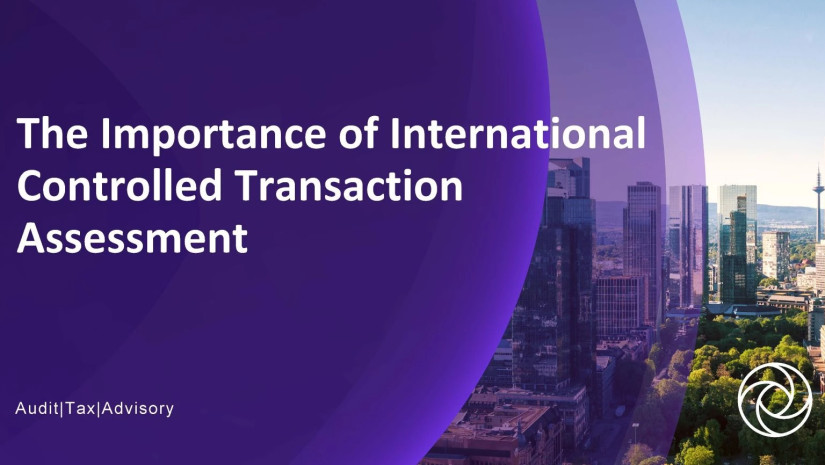Ketevan Ghambashidze,
Director Tax
International controlled transaction assessment and transfer pricing issues are becoming increasingly relevant in Georgia's tax reality. The increased activity of the Revenue Service in this direction creates significant challenges for businesses and requires proper attention.
An international controlled transaction represents an operation between related parties where one party is not a resident of Georgia and/or one party is located in a country with a preferential tax regime and/or one party is a Free Industrial Zone enterprise.
The relevant articles of the Georgian Tax Code that regulate transfer pricing issues are provided in Chapter 17 of the Tax Code: "Assessment of International Controlled Transactions." The legislation determines that controlled transactions must comply with the arm's length principle; the taxpayer is obligated to prove the transaction's compliance with market conditions, while the Revenue Service has the right to verify the compliance of controlled transactions with this principle.
Based on Article 70 of the Tax Code, the Revenue Service has the right to request transfer pricing documentation, and companies are obligated to provide justification regarding the compliance of operations with the arm's length principle. In case of a request from the tax authority, companies must submit the relevant documentation within 30 calendar days.
Recently, the Revenue Service has significantly strengthened control in the transfer pricing sphere. Many companies have received notifications referring to Article 70 of the Tax Code, which implies the obligation to submit information about controlled transactions. Additionally, the number of tax audits focused on transfer pricing issues has increased. This trend corresponds to international practice, where tax authorities pay increasing attention to international business operations and income outflow to low-tax jurisdictions.
Proper assessment of controlled transactions is also in the company's own interest. The quality of audited financial statements significantly depends on this issue, as international audit companies pay special attention to transactions with related parties. The existence of transfer pricing documentation and compliance with the arm's length principle are important for obtaining a positive audit opinion.
A transparent and substantiated transfer pricing policy strengthens a company's reputation and reduces questions regarding corporate responsibility. Transfer pricing analysis often reveals opportunities for improving business processes and contributes to increased efficiency. Well-documented transfer pricing policy also increases investors’ confidence and reduces investment risks.
In particular, the need for transfer pricing services and proper transaction assessment is critical for:
- Companies engaged in cross-border transactions with related parties (including services, goods, loans, royalties, etc.);
- Businesses with international group structures, especially where at least one party is located in a low-tax jurisdiction or a Free Industrial Zone;
- Multinational corporations operating in Georgia, including regional headquarters, service centers, and distribution hubs;
- Companies undergoing or expecting a tax audit or receiving notifications from the Georgian Revenue Service under Article 70;
- Businesses planning significant related-party transactions and seeking to minimize tax risks through Advance Pricing Agreements (APAs);
- Companies preparing for financial statement audits, where transfer pricing documentation is essential to receive a clean audit opinion;
- Investment-driven businesses wishing to increase transparency and improve their reputation among investors and regulators;
- Any business aiming for long-term tax compliance and risk management through a structured transfer pricing policy.
The Georgian Tax Code also provides the possibility of obtaining an Advance Pricing Agreement (APA) related to international controlled transactions. This is a preliminary agreement between the company and the Revenue Service on the methodology of transfer pricing for controlled transactions. The advantage of such an agreement is legal certainty — the company has a guarantee that operations conducted with the agreed methodology will not become the subject of tax disputes.
An advance agreement significantly reduces the risks associated with transfer pricing adjustments and the probability of additional tax assessments. It also excludes disputes with the Revenue Service on transfer pricing issues and gives the company the opportunity for long-term planning without tax uncertainty. To obtain an advance agreement, the company must apply to the Revenue Service with a special application that details the planned controlled transactions and pricing methodology.
For companies that carry out operations with related parties, it is crucial to conduct an internal audit and/or involve professional tax advisors to identify controlled transactions. It is necessary to prepare transfer pricing documentation, including information about the group structure, economic justification of operations, pricing methodology, and comparative analysis. Companies should review and, if necessary, make adjustments to the pricing policy of operations, consider the possibility of an advance pricing agreement with the Revenue Service, and involve tax consultants in the process of preparing appropriate documentation.
Proper assessment and documentation of international controlled transactions is not only a legislative requirement but also an important tool for business risk management and a mechanism for protecting the company's own interests. It is also necessary for obtaining a positive audit opinion. The activation of the Revenue Service in this direction indicates that companies should pay more attention to this issue. Preparation of appropriate documentation, review of pricing policy, and, where possible, conclusion of an advance pricing agreement will help businesses avoid significant financial risks and tax disputes.
Grant Thornton is one of the world’s leading organizations of independent assurance, tax and advisory firms. Grant Thornton firms help dynamic organizations unlock their potential for growth by providing meaningful, forward-looking advice. Proactive teams, led by approachable partners in these firms, use insights, experience and instinct to understand complex issues for privately owned, publicly listed and public sector clients and help them to find solutions. More than 76,000 Grant Thornton members in over 150 countries are focused on making a difference to clients, colleagues and the communities in which we live and work.
‘Grant Thornton’ refers to the brand under which the Grant Thornton member firms provide assurance, tax and advisory services to their clients and/or refers to one or more member firms, as the context requires. ‘GTIL’ refers to Grant Thornton International Ltd (GTIL). GTIL and each member firm of GTIL is a separate legal entity. GTIL is a non-practicing, international umbrella entity organised as a private company limited by guarantee incorporated in England and Wales. GTIL does not deliver services in its own name or at all. Services are delivered by the member firms. GTIL and its member firms are not agents of, and do not obligate one another and are not liable for one another’s acts or omissions



















